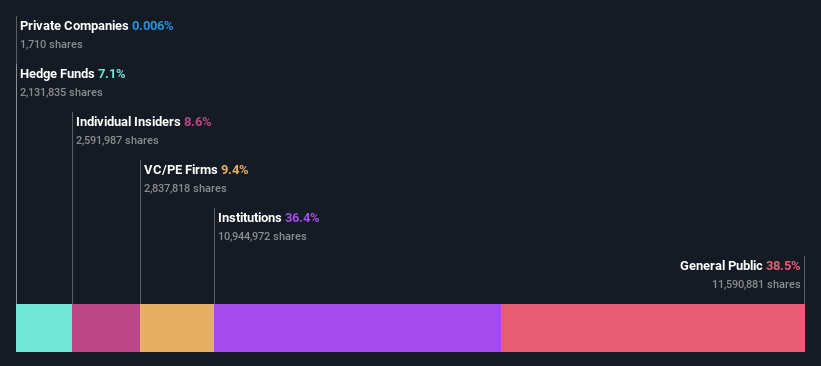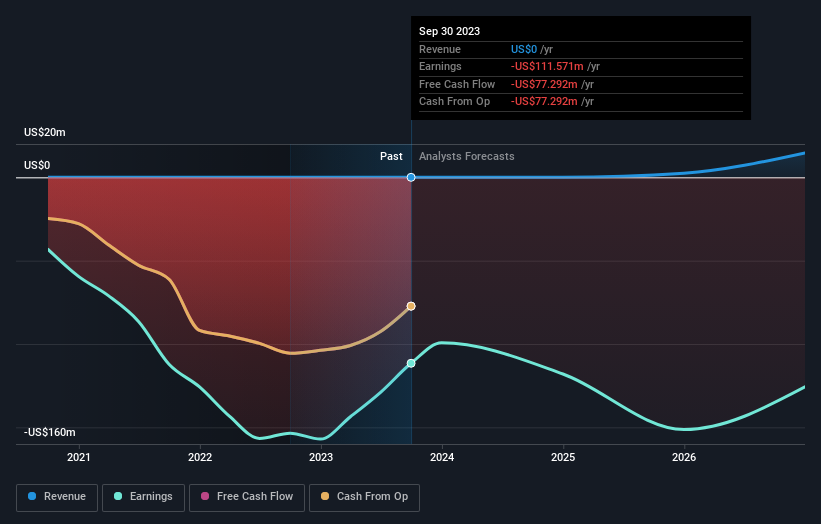Relmada Therapeutics, Inc.'s (NASDAQ:RLMD) market cap touched US$109m last week, benefiting both individual investors who own 39% as well as institutions
Key Insights
Relmada Therapeutics' significant individual investors ownership suggests that the key decisions are influenced by shareholders from the larger public
50% of the business is held by the top 20 shareholders
To get a sense of who is truly in control of Relmada Therapeutics, Inc. (NASDAQ:RLMD), it is important to understand the ownership structure of the business. And the group that holds the biggest piece of the pie are individual investors with 39% ownership. That is, the group stands to benefit the most if the stock rises (or lose the most if there is a downturn).
Following a 10% increase in the stock price last week, individual investors profited the most, but institutions who own 36% stock also stood to gain from the increase.
Let's take a closer look to see what the different types of shareholders can tell us about Relmada Therapeutics.
View our latest analysis for Relmada Therapeutics
What Does The Institutional Ownership Tell Us About Relmada Therapeutics?
Many institutions measure their performance against an index that approximates the local market. So they usually pay more attention to companies that are included in major indices.
As you can see, institutional investors have a fair amount of stake in Relmada Therapeutics. This suggests some credibility amongst professional investors. But we can't rely on that fact alone since institutions make bad investments sometimes, just like everyone does. If multiple institutions change their view on a stock at the same time, you could see the share price drop fast. It's therefore worth looking at Relmada Therapeutics' earnings history below. Of course, the future is what really matters.
It would appear that 7.1% of Relmada Therapeutics shares are controlled by hedge funds. That worth noting, since hedge funds are often quite active investors, who may try to influence management. Many want to see value creation (and a higher share price) in the short term or medium term. Deep Track Capital, LP is currently the company's largest shareholder with 9.4% of shares outstanding. For context, the second largest shareholder holds about 7.1% of the shares outstanding, followed by an ownership of 6.3% by the third-largest shareholder.
Looking at the shareholder registry, we can see that 50% of the ownership is controlled by the top 20 shareholders, meaning that no single shareholder has a majority interest in the ownership.
While it makes sense to study institutional ownership data for a company, it also makes sense to study analyst sentiments to know which way the wind is blowing. Quite a few analysts cover the stock, so you could look into forecast growth quite easily.
Insider Ownership Of Relmada Therapeutics
While the precise definition of an insider can be subjective, almost everyone considers board members to be insiders. The company management answer to the board and the latter should represent the interests of shareholders. Notably, sometimes top-level managers are on the board themselves.
Most consider insider ownership a positive because it can indicate the board is well aligned with other shareholders. However, on some occasions too much power is concentrated within this group.
We can report that insiders do own shares in Relmada Therapeutics, Inc.. As individuals, the insiders collectively own US$9.4m worth of the US$109m company. This shows at least some alignment, but we usually like to see larger insider holdings. You can click here to see if those insiders have been buying or selling.
General Public Ownership
The general public, who are usually individual investors, hold a 39% stake in Relmada Therapeutics. While this group can't necessarily call the shots, it can certainly have a real influence on how the company is run.
Private Equity Ownership
With a stake of 9.4%, private equity firms could influence the Relmada Therapeutics board. Sometimes we see private equity stick around for the long term, but generally speaking they have a shorter investment horizon and -- as the name suggests -- don't invest in public companies much. After some time they may look to sell and redeploy capital elsewhere.
Next Steps:
It's always worth thinking about the different groups who own shares in a company. But to understand Relmada Therapeutics better, we need to consider many other factors. Like risks, for instance. Every company has them, and we've spotted 3 warning signs for Relmada Therapeutics (of which 1 is a bit unpleasant!) you should know about.
But ultimately it is the future, not the past, that will determine how well the owners of this business will do. Therefore we think it advisable to take a look at this free report showing whether analysts are predicting a brighter future.
NB: Figures in this article are calculated using data from the last twelve months, which refer to the 12-month period ending on the last date of the month the financial statement is dated. This may not be consistent with full year annual report figures.
Have feedback on this article? Concerned about the content? Get in touch with us directly. Alternatively, email editorial-team (at) simplywallst.com.
This article by Simply Wall St is general in nature. We provide commentary based on historical data and analyst forecasts only using an unbiased methodology and our articles are not intended to be financial advice. It does not constitute a recommendation to buy or sell any stock, and does not take account of your objectives, or your financial situation. We aim to bring you long-term focused analysis driven by fundamental data. Note that our analysis may not factor in the latest price-sensitive company announcements or qualitative material. Simply Wall St has no position in any stocks mentioned.


